“Why am I so insecure around other people? I feel like it’s the biggest obstacle getting in the way of relationships. How am I supposed to cope? I’m tired of feeling insecure. It makes me feel so lonely.”
Social insecurity is common. In this article, you will learn how you can cope if you’re struggling with it. I’ll go through some of the best strategies to help you feel more confident and comfortable around others.
Sections
What is social insecurity?
Social insecurity is a feeling of uncertainty and social unworthiness. It often creates anxiety about friendships, relationship goals, and your confidence to handle social situations. This is something that everyone can feel to a certain degree.
If you feel socially insecure, you might:
- Be embarrassed when you’re around others.
- Feel extremely nervous around strangers.
- Replay what you’re going to say multiple times before you say it.
- Feel convinced that other people don’t like you.
- Believe that your flaws or mistakes are more pronounced than anyone else’s.
- Struggle with making friends or meaningful relationships.
Feeling insecure is a normal human experience. Everyone wants to belong to a group, so it’s normal to feel afraid of rejection. But if your insecurity is affecting your relationships, school, work, or overall well-being, you may need to start working on this issue intentionally. For example, if your social insecurity prevents you from attending important social events.
How to deal with social insecurity
Now that you know the main causes of anxiety and insecurity, we’re going to unpack some of the best suggestions for coping with this issue. Remember that suggestions are not cures.
Additionally, they are only as effective as your ability to implement them! Working on your insecurity means dedicating time, effort, and patience to the process.
Identify your triggers in advance
Think about all the situations where you feel most insecure. Get a journal and start writing these situations down. If you’re struggling to identify these triggers, ask yourself these questions:
- Who makes me feel bad about myself?
- Where do I feel most anxious?
- When am I most likely to engage in self-destructive behaviors?
Knowing your triggers can help you prepare for them. If you know you’re going to be in a stressful situation, you can anticipate it. You can also plan out how you’d like to respond.
To get you started, some common social insecurity triggers include:
- Attending an event where you don’t know anyone.
- Being around your family.
- Going on dates or talking to someone you like romantically.
- Meeting with your boss.
- Having to stand up for yourself in front of a crowd.
- Receiving feedback from someone else.
Learn to talk to yourself like you would talk to a good friend
What kinds of messages do you tell yourself? Would you ever tell those messages to someone you love? Probably not!
Most of us have overly harsh inner critics that want to destroy our confidence every chance they get. These critics may seem motivating, but they tend to be self-defeating. Instead of feeling empowered, they often make us feel small and worthless.
When your inner critic starts attacking you, take a moment and ask yourself, what would I tell my best friend right now?
Focus on improving your social skills
If you can become more socially adept, you can feel more confident around others.
Gaining mastery over social skills takes time, but it’s one of the most important ways of feeling connected with people. After all, if you always feel awkward or don’t know what to say, your discomfort will make you feel insecure. And the insecurity will make you feel uncomfortable. It can be a defeating and frustrating cycle.
It may be helpful to start reading more about social skills. Check out our master guide of the best books on this topic.
Remember that avoidance tends to make things worse
It’s natural to want to avoid the triggers that make you feel insecure. In the short-term, avoidance can offer some relief. However, this approach isn’t a sustainable solution if you truly want to work on your social skills.
Instead, it’s helpful to remind yourself about the benefits of exposure. Keep telling yourself that you need to practice being in social situations to feel more comfortable around others.
See our guide on how to be more social.
Learn how to put your own needs first
Many insecure people don’t believe their needs matter. Instead, they may focus on helping everyone else around them. While compassion is important, you can’t neglect yourself if you want to feel more confident.
You can prioritize self-care by:
- Getting enough sleep and allowing yourself to rest when you feel tired.
- Exercising regularly.
- Maintaining a healthy diet and eating consistently.
- Practicing gratitude.
- Meditating when you feel stressed or upset.
- Engaging in hobbies and activities that make you feel happy.
Spend more time with positive people who support you
Nurture your relationships with loved ones by prioritizing the time you spend with them. Friendships are a two-way street. You need to put in your effort by checking in and making plans if you want them to feel connected with you.
If you struggle with your relationships, check out our guide on being a genuine friend to others.
Practice challenging negative thoughts
If you beat yourself up after you make a mistake, you may find yourself in an endless cycle of shame and self-loathing. Instead, try to challenge negative thoughts by asking yourself:
- What’s another way I can look at this situation?
- How can I gain some perspective from this?
- What is the worst-case scenario, and what is the best-case scenario?
- What would someone else say about this situation?
- How can I practice self-compassion right now?
Do things that you enjoy doing
We tend to feel more confident when we get “lost” in an activity. It doesn’t matter what the activity is, but it should be one that makes you feel happy and stimulated. Try to make time to engage with these pleasant activities as often as possible.
If you don’t have any hobbies, make it a personal goal to find one! To get started, check out these helpful tips by The Muse.
Limit your social media use
Research shows that social media can negatively affect your well-being.[3] Most people use social media to showcase their successes, and the platforms act like a “highlights reel,” displaying everyone’s seemingly extraordinary lives.
Social media can make you feel bad about yourself because you naturally start comparing yourself to other people. This social comparison tends to be a lose-lose situation. Even if you “look good” online, it doesn’t mean much if you feel insecure. Additionally, you may start depending on online validation (likes, comments, and follows) to ensure your worth.
To limit your social media use, consider:
- Disabling social media notifications on your phone.
- Setting time limits for how long you will engage with social media.
- Trying a digital detox or committing to going Internet-free for a few hours each week.
Practice self-compassion
Self-compassion is about accepting ourselves and then also being kind toward ourselves. It is basically like treating ourselves just as we would treat a good friend.
A self-compassionate mindset helps us because it helps us face our fears instead of avoiding them. Self-compassion can also help reduce self-criticism. PositivePsychology writes more about how to practice self-compassion here.
Catch your own judgments
Combating social insecurity means recognizing your own judgments and trying to change how they affect you. For example, if you think you are awkward, try to think about the evidence that may challenge this judgment. This might mean thinking about the times you didn’t feel awkward or reflecting on the friends who like you.
Fake it ‘til you make it
Pretend that you’re socially confident. When you walk into a social event, tell yourself, people will like me. I am a good person.
If you’re talking to someone new, tell yourself, This person is already my friend. This can help you feel more relaxed and present with the conversation.
Remind yourself these mantras as often as you need. Even if you’re “faking it,” this suggestion isn’t about being cocky or disingenuous. Instead, it’s about taking on a mentality of confidence.
Remind yourself that most people feel insecure
It can be helpful to remember that you’re not alone in your struggles. Most people want to be liked, and they worry about their flaws or mistakes.
Even people who appear incredibly confident on the outside may be battling their own insecurity demons. The next time you’re with others, remind yourself that most people are also nervous about how well they fit in.
Consider going to therapy
Sometimes, self-help strategies aren’t enough for working on social insecurity. This is especially true if your insecurity stems from a mental health issue like depression or anxiety.
If you’re struggling, consider reaching out for professional support. A therapist can help you understand your underlying triggers and teach you helpful strategies for managing your symptoms. They can also support you in processing your emotions and fears.
We recommend BetterHelp for online therapy, since they offer unlimited messaging and a weekly session, and are cheaper than going to a therapist's office.
Their plans start at $64 per week. If you use this link, you get 20% off your first month at BetterHelp + a $50 coupon valid for any SocialSelf course: Click here to learn more about BetterHelp.
(To receive your $50 SocialSelf coupon, sign up with our link. Then, email BetterHelp’s order confirmation to us to receive your personal code. You can use this code for any of our courses.)
What are the main causes of social insecurity?
There isn’t a single cause for this issue. However, some well-known risk factors may trigger social insecurity.
Social anxiety
If you have social anxiety, you may struggle with feeling preoccupied with what other people think about you. You might obsess over certain social events and avoid some of them altogether. You might also experience physical symptoms like blushing, sweaty palms, or panic attacks when confronted with these social events.
It’s important to know the difference between social anxiety vs. insecurity. Social anxiety is more about the manifestation of anxiety symptoms in social settings. On the other hand, insecurity is more about feeling ashamed, unworthy, or inferior around others.
Here’s our recommended reading on social anxiety.
Depression
Depression can make you think harsh and negative thoughts about yourself. For example, you may perceive yourself as worthless or stupid. These thoughts can cloud your judgment and make you feel insecure when you’re around other people.
Unfortunately, it can become a self-fulfilling prophecy. Negative thoughts tend to trigger negative behaviors. If you think poorly about yourself, you might engage in self-destructive behaviors like isolating from others or picking fights. This pattern can then make you feel even more insecure.
Learn more in Verywell Mind’s overview of depression.
Trauma
If you’ve experienced trauma, you may feel hesitant about trusting others. Trauma can exaggerate the fight-or-flight reflex, which means you may be more hypervigilant and sensitive around other people.[1]
Trauma can include instances of physical, emotional, or sexual abuse. But it can also include issues like neglect, feeling threatened by others, or experiencing chronic and persistent stress.
To better understand the different types of trauma, read this comprehensive trauma article by HelpGuide.
Toxic friendships or partners
If you have friends or partners who continue to ridicule or insult you, their actions may make you feel socially insecure. Other people play such an important role in validating us. If you don’t feel like you deserve their approval, you may doubt your self-worth.
Here’s what to look out for in a toxic friendship.
Stress
Chronic stress can wreak havoc on your emotions and well-being. When you’re under stress, you may feel heightened feelings of fear, anger, sadness, or resentfulness. These feelings can also cause physical reactions, like sleep problems, making you feel even worse.[2]
WebMD has a list of tips for how to manage stress.
Perfectionism
If you struggle with perfectionism, you may have unrealistic expectations about yourself and your performance. Perfectionists can motivate you to achieve success, but it can also make you feel anxious and inadequate.
Many times, perfectionism is a cover-up for insecurity. You may measure your worth based on what you accomplish, rather than based on who you are. If you’re not sure if you’re a perfectionist, check out these telltale signs by Forbes.
Past history of rejection
If someone has rejected you in the past, it can leave a lasting imprint on your confidence. You might feel panicked about the thought of it happening again. This is especially true if the rejection happened unexpectedly, or if it happened in a dramatic, public way.
Poor body image
If you don’t like the way you look, your internal judgments can make you feel insecure around other people. For example, if you are convinced that you are ugly, you may believe others will think that way. You might think they won’t like you because of your appearance.
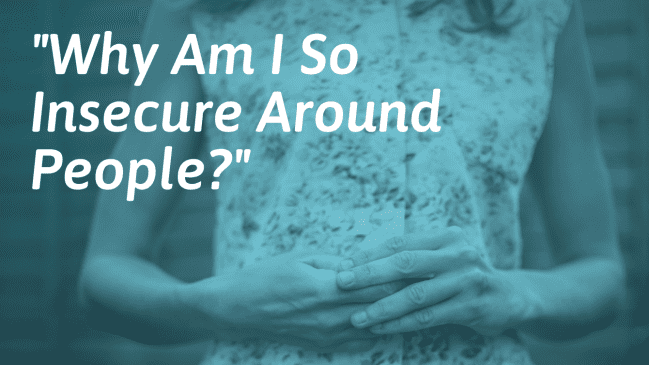

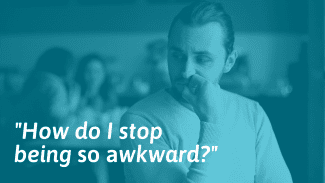



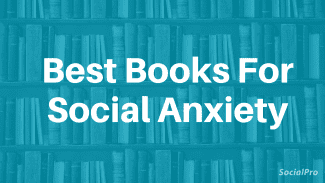
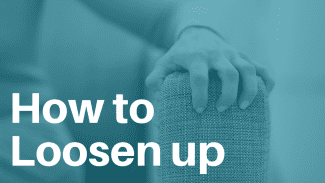
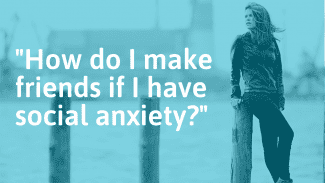
Thank you so much for this amazing article.
But I live in a country where you have to be extremely respectful towards guests and everything like food and stuff has to be very very perfect and luxury. That makes me terrified of guests and I am very uncomfortable in home parties. And my mom and sister make me feel so imperfect and awkward. It’s not new to me and I don’t what to do about it.